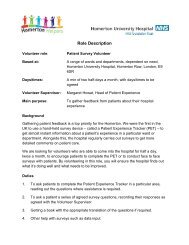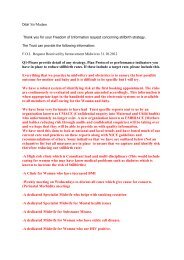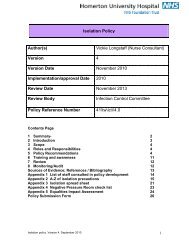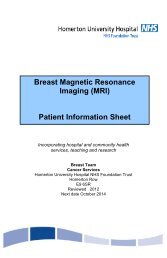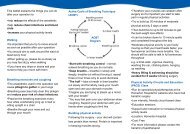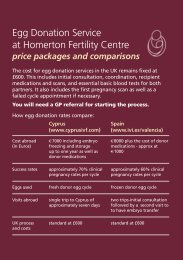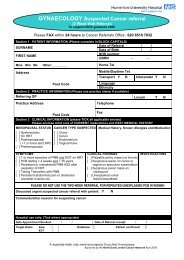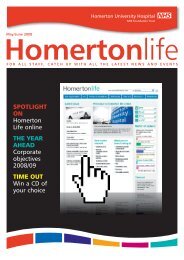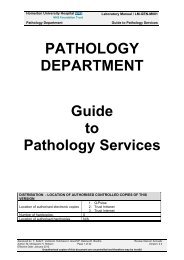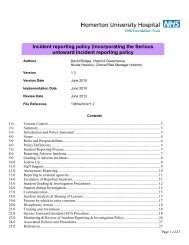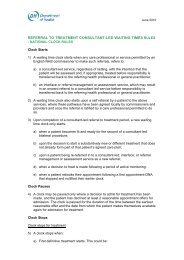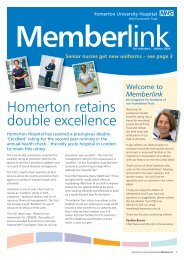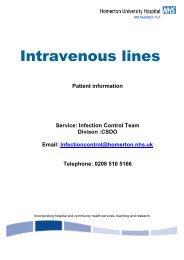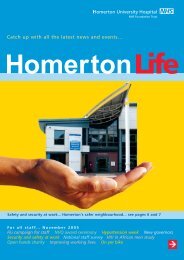A28656 homerton HIV report - Homerton University Hospital
A28656 homerton HIV report - Homerton University Hospital
A28656 homerton HIV report - Homerton University Hospital
Create successful ePaper yourself
Turn your PDF publications into a flip-book with our unique Google optimized e-Paper software.
<strong>Homerton</strong> <strong>University</strong> <strong>Hospital</strong><br />
NHS Foundation Trust<br />
‘I count myself<br />
as being in a different world’:<br />
African gay and bisexual men living with <strong>HIV</strong> in London.<br />
Lesley Doyal, Jane Anderson and Sara Paparini
Contents<br />
1 Introduction<br />
2 Background<br />
3 Study design and implementation<br />
4 Characteristics of the sample<br />
5 Key aspects of life with <strong>HIV</strong>/AIDS<br />
5 Finding out about their status<br />
7 Dilemmas of disclosure<br />
8 Social relationships: separation and secrecy<br />
10 Sexuality, sexual practices and <strong>HIV</strong><br />
12 Health services<br />
14 Religion: conflict and support<br />
15 Meeting the challenges of living with <strong>HIV</strong><br />
18 Conclusions: managing the contradictions<br />
19 References<br />
20 Acknowledgements<br />
21 Affiliations
In this <strong>report</strong> we describe the ways in which <strong>HIV</strong> infection shapes the<br />
lives of a group of black African men who are gay or bisexual. The<br />
<strong>report</strong> contributes to the very sparse literature both on <strong>HIV</strong> amongst<br />
Africans in the diaspora and on African sexual minorities. It is the third<br />
in a series of interlinked projects exploring the lives of people from<br />
African backgrounds living with <strong>HIV</strong> in London. The first illustrated the<br />
experiences of heterosexual women (1, 2), while the second examined<br />
the lives of heterosexual men (3). The research <strong>report</strong>ed here makes a<br />
contribution to increasing knowledge about an important and<br />
vulnerable group of men.<br />
1
Background<br />
Much of the research work that has been carried out among people living with <strong>HIV</strong> in the UK has<br />
considered gay men and black African heterosexual men and women separately. However this means<br />
that the experiences and needs of people who simultaneously belong to both populations – African men<br />
with <strong>HIV</strong> who have sex with men - have been overlooked. The invisibility of African men who have sex<br />
with men (MSM) within the <strong>HIV</strong> epidemic is compounded by the extensive stigma associated with both<br />
<strong>HIV</strong> and same-sex relationships in many African communities (4, 5). This makes it particularly difficult<br />
for men in this situation to disclose either their sexual orientation or their <strong>HIV</strong> infection to others.<br />
About 480,000 people (0.8%) of the UK population are black African, of whom 78% live in London (6).<br />
Despite accounting for less than 1% of the UK population, African people carry a disproportionate<br />
burden of the <strong>HIV</strong> epidemic. In 2005, of the 45,344 people in England and Wales who were seen for<br />
<strong>HIV</strong> care 21,152 (46%) were people of African origin. In the same year 7,645 new diagnoses of <strong>HIV</strong> were<br />
<strong>report</strong>ed of which 3,345 (44%) were in people of African origin. Of these new diagnoses amongst<br />
African people 2,202 were in women and 1,143 in men (7). 26 of the men had acquired <strong>HIV</strong> from samesex<br />
relationships (8).<br />
During 2005, 251 black African MSM accessed <strong>HIV</strong>-related care in England, Wales & Northern Ireland<br />
(9). In a hospital-based survey of 1,687 people attending specialist <strong>HIV</strong> clinical services in East London<br />
in 2004, 13 (1.7%) of the 758 MSM who took part described themselves as black African (10). However<br />
these figures are likely to be an underestimate because some men from Africa will be reluctant to<br />
identify as ‘homosexual’ at the point of registration in GUM and <strong>HIV</strong> clinics (11, 12). Accurate data on the<br />
numbers of African MSM living with <strong>HIV</strong> are therefore difficult to obtain and as we shall see, almost<br />
nothing is known about the wider circumstances of their lives.<br />
The research that is described in this <strong>report</strong> is important because it begins to fill that knowledge gap<br />
through describing the experiences of African MSM. We believe that this information will be particularly<br />
relevant to the development of appropriate health and social care services and prevention initiatives<br />
for this population.<br />
2
Study design and implementation<br />
The research that we describe here happened in two stages. An initial review of the published literature<br />
revealed no studies that focussed specifically on gay/bisexual African men in the UK. In order to explore<br />
the particular issues faced by men with <strong>HIV</strong> we felt it important to first obtain a more general view of<br />
the life experiences of African gay and bisexual men. The fieldwork for this first phase of the project<br />
was completed in 2006 and consisted of a focus group with 15 participants of unknown <strong>HIV</strong> status and<br />
a series of eight individual semi-structured interviews.<br />
The findings provided an important overview of the key issues faced by a group of African gay/bisexual<br />
man living in London - whatever their <strong>HIV</strong> status. Information collected from phase 1 was then used to<br />
inform the second phase, which explored the experiences of gay and bisexual men from African<br />
backgrounds who were also living with <strong>HIV</strong>. It is this phase two study, which is <strong>report</strong>ed on here.<br />
Ethics approval for both research stages was obtained from the relevant committees and recruitment<br />
was carried out between February 2006 and February 2007 through voluntary organisations for people<br />
living with <strong>HIV</strong>, e-networks of black gay/bisexual men, and <strong>HIV</strong> clinics across a number of London<br />
hospitals. This process proved to be extremely difficult and, although at least 25 men discussed the<br />
study with either their regular clinicians, voluntary sector agencies or directly with the research team,<br />
in the end only eight men agreed to be interviewed and to be included in the study.<br />
The limited size of the sample reflects in part the small number of African men known to be<br />
gay/bisexual and receiving <strong>HIV</strong> related health care in the UK (around 250 in all) (9). Hence it is clear<br />
that participants could only be sought from what is currently a small pool. There were also inevitable<br />
difficulties in accessing networks that are often underground. Both <strong>HIV</strong> and homosexuality are highly<br />
stigmatised, making it hard to find men who are willing to discuss their life experiences. Hence this<br />
study can only be seen as exploratory.<br />
Individual semi-structured interviews were carried out with black African men who <strong>report</strong>ed having sex<br />
with men, were born in Sub-Saharan Africa, were living in London, and had been diagnosed <strong>HIV</strong> + for<br />
more than six months at the time of the interview.<br />
All the interviews were conducted on hospital premise but in non-clinical spaces. All participants spoke<br />
English. Before agreeing to take part all the men were given detailed information about the study and<br />
their written informed consent was obtained if they agreed to take part. Travelling expenses were<br />
reimbursed but no other payments were made. All participants agreed to be tape-recorded, though a<br />
choice was offered if they preferred the interviewer to take notes. Interviews lasted between one and<br />
two hours. All the data from the interviews was then subjected to thematic analysis that elicited the key<br />
issues presented in this <strong>report</strong>.<br />
The voices of the men are represented in the <strong>report</strong> using quotes from their narratives, but with no<br />
identifying data about which of the men is speaking.<br />
3
Characteristics of the sample<br />
The eight men in the sample came from seven different African countries. Age range was 27 - 43 years old<br />
with the majority being over 30 years old. The participants had lived in the UK for 10 years on average<br />
(range 2 - 17 years) and the majority had been diagnosed <strong>HIV</strong> positive for more than five years (range 1 - 17<br />
years). The majority of the men were living by themselves in council houses or private homes. Five men<br />
were regularly employed and their economic situation appeared to be stable. Though some men discussed<br />
the desire to change jobs and careers, most were reasonably satisfied with their current positions.<br />
For the three men without work, the situation was clearly much harsher. They were living on welfare<br />
benefits with very small amounts of money and some had been doing so for lengthy periods. One man<br />
stated that he sometimes resorted to sex work to make ends meet. Amongst the reasons why they were<br />
not employed, physical and psychological health problems, <strong>HIV</strong>-related stigma and immigration status<br />
were all mentioned.<br />
‘It is hard living on benefit, because all you do is pay the water rate, your rent, your bill and you’re left with<br />
something like 40 pounds a week, you can’t even save to buy nice clothes or anything...’<br />
‘They give me £28.00 and I have to go and look for my own money for clothes, people have to give me<br />
money, like, sometimes I have to have sex with people to get money…and then it’s no good, it’s no good for<br />
me to do that…’<br />
Many expressed an aspiration to settle into some kind of job in which the employers will understand their<br />
needs as <strong>HIV</strong> positive people, and where they could be open as gay men.<br />
‘I would love to find another job where I can actually come out and be myself. Rather than stick in that same<br />
job and living a double life...not telling them that I’m actually <strong>HIV</strong> positive, that’s one thing, not telling them<br />
I’m actually gay that’s another thing…’<br />
Two of the men in the sample were experiencing difficulties in relation to their immigration status. For these<br />
men, the daunting possibility that they might have to return to their own country created constant anxiety<br />
and distress. They feared for their health if they had to live in a situation where treatment for <strong>HIV</strong> was not<br />
available. However they were also concerned for their safety if their sexual identity was revealed. Because<br />
homosexuality is illegal and highly stigmatised in their countries of origin, they would be vulnerable to<br />
blackmailing, harassment, violence and arrest.<br />
‘That is my only fear because if I go back to my country, as a gay person I cannot live comfortably at all. The<br />
<strong>HIV</strong> is a worry…but that has a solution, which is having a good job, having money to get the medication. But<br />
being gay has no solution, because you are just surrounded by people that don’t like you...that is the main<br />
problem I have as a black African living in the UK’<br />
‘If they say to go home, to tell somebody to go to a country where the person can’t get treatment you are<br />
looking for the person to be dead...my life is in danger because I have two things over there you understand.<br />
Either my <strong>HIV</strong> is gonna kill me, ‘cos I will get no medication, or just people will just take my life off...they<br />
would just break the house down…they would just put a fire in there because of me’<br />
These men therefore shared the experience of being African and living in London. They also had their<br />
homosexuality/bisexuality in common. All had to find their own ways of managing <strong>HIV</strong>/AIDS and the choices<br />
were often very difficult. Life in London offered considerable benefits in the way of access to health care<br />
and more liberal sexual attitudes. But at the same time the men had to negotiate complex realities reflecting<br />
not just their illness but their identity as black Africans and gay/bisexual men.<br />
4
Key aspects of life with <strong>HIV</strong>/AIDS<br />
Finding out about their status<br />
The opportunities for counselling and testing in the UK are much greater than most of the men had<br />
been used to but still the choice to use them was often difficult. About half of the men decided to have<br />
the test either as a routine check, or because of doubts over their partner’s behaviour.<br />
‘Just to know. I’ve always identified with the adverts that say ‘go for your test, know your <strong>HIV</strong> status’<br />
‘Cos I was seeing someone and he just disappeared for a while, and we’d been having unprotected sex<br />
so...I thought ‘oh God maybe he’s ill or something’. I just freaked out and I went and had a test’<br />
The rest decided to have an <strong>HIV</strong> test because they were feeling ill and their health did not seem to improve.<br />
‘And usually I would feel very tired, very weak, and I would feel really completely different from how I<br />
was in Africa. I would say ‘what is happening with me’ and I thought is it this type of job…or maybe the<br />
weather and the change in this country is affecting me...’<br />
Some delayed investigations even after it had been suggested to them by clinical staff. The most<br />
common reasons given for this delay related to their anxieties and prejudices about <strong>HIV</strong>.<br />
‘And one doctor said to me ‘it would be a good idea if you actually had an <strong>HIV</strong> test’. By that time I was<br />
really ignorant about it, you know. When people say ‘<strong>HIV</strong> test’...it’s just like ‘no, no, no, I’m not gonna<br />
have it, I’m not gonna have it, I’m not gonna have it!!’ I was scared, I was not really prepared…Because I<br />
was so negative...and because I was sick at the time, I was in hospital, and because of my condition, I<br />
didn’t want to know, I wasn’t actually prepared to go through that and being ill at the same time’<br />
Only one man stated that he was not surprised by his diagnosis:<br />
‘I’m not among those Africans who present late. I knew because of my sexual practice…but I kept it at<br />
heart until I said ‘I should go and test’…I knew already so it wasn’t a shock’<br />
For the rest the result did come as a very great shock, and some thought they were going to die right<br />
away. For those men diagnosed in the early 1990’s, little information was available about the treatment<br />
for <strong>HIV</strong>. For those diagnosed more recently, the news still came as a massive blow. They were able to<br />
access information and counselling and quickly realised that their chances of surviving for a long time<br />
were quite high. However many were burdened by experiences of <strong>HIV</strong>/AIDS in their country of origin,<br />
and associated their own situation with that of people dying in terrible conditions in Africa. Reaction to<br />
their diagnosis was also influenced by worries for their current and previous partners.<br />
‘Well, it was shattering, you know. It’s not the best of news. I’ve always just wanted to have the test and<br />
this society made it more easier for me, because back home you cannot just go for that test…So I just<br />
had a test and it was really not a good news’<br />
5
‘I took a deep breath and I said ‘oh, my God’...all the plans I had, of wanting to go to college, wanting to<br />
make something out of my life, I wanted to have a family, I wanted to have children...now I’m told<br />
this...because then we still had this stigma of ‘if you’re <strong>HIV</strong> positive, you’re dying, tomorrow’. And there<br />
was…a counsellor…so they started talking it through ‘this is nothing new, you don’t have to worry,<br />
there’s help, there’s this organisation, you can come here for counselling or blah blah blah’. And I was<br />
just there, I just couldn’t understand them, because my mind then switched off completely in a different<br />
world…It was a nightmare’<br />
‘When I was young there was one lady who lived close to us…she was <strong>HIV</strong> and (her) appearance was<br />
very bad…she was very skinny, and nobody would touch her, and nobody would even sit on a chair if she<br />
had been on the chair, or even touch the chair, nobody wanted to eat with her, and everybody just<br />
ignored her, that’s what I knew about <strong>HIV</strong> ever since I was young…I was sort of shocked ‘cos I knew I was<br />
going to die…I assumed that my life is going to end very soon…And the doctor he sit down with me for<br />
about 3 or 4 hours and explained it to me ‘you have <strong>HIV</strong> and we can treat <strong>HIV</strong>…not to damage you<br />
badly, and ruin your life’. And he showed me how they can treat the <strong>HIV</strong>’<br />
After their diagnosis most men did not describe feelings of anger towards any particular person that<br />
they believed might have been responsible for their infection. Instead most stressed the importance of<br />
thinking positively about their future and learning to accept what had happened.<br />
‘I didn’t want to blame anybody…I just didn’t want to point a finger at anybody...so it’s just like imagining<br />
where you could have got anything’<br />
‘I just refuse to think of that. I see it as a responsibility...if it was a mistake I made, I made it by<br />
myself and I don’t think I have to blame anyone for it…I tell a lot of people, they say ‘how did you have<br />
it, why did you get it’ I say ‘that’s nothing I want to go into’. I mean, it’s the past, it’s already<br />
happened…I’m an adult…I think if both people are adults, they should take responsibility for whatever<br />
risk they’re going into’<br />
‘I’m not going to lie down in bed and think ‘oh God, where did I actually get infected From who From<br />
this, from that’, blaming people…that’s me, that’s what I am. And I just move on and get on with my life.<br />
I put all the negative side away, I grab the positive side and just hold it. I know I’m not going to feel well,<br />
I’m not going to get better. But who knows in ten years time, in fifteen years time there might be a cure<br />
for it! Who knows’<br />
6
Dilemmas of disclosure<br />
Disclosure of their <strong>HIV</strong> diagnosis was very difficult because of what they saw as the social stigma<br />
against the disease especially among fellow Africans. For some of the men this was compounded by<br />
what they assumed would be a negative attitude towards their sexual identity. However most <strong>report</strong>ed<br />
having disclosed their <strong>HIV</strong> status to a few people close to them. This usually included their current<br />
partner if they considered themselves to be in a serious relationship.<br />
‘My flatmate, he’s the only one I trust…He’s my best friend, yeah. And he was giving me all the support.<br />
I trust him well. And if anything happened to me at home, he would know what to do’<br />
‘It’s only my girlfriend, my previous girlfriends, and the group friends, we go to the organisations or the<br />
groups...the positive circle’<br />
Very few of the men had disclosed to members of their family. A few told a brother or sister but parents<br />
were rarely informed. Like other Africans living in the UK, some men in this study explained their<br />
secrecy in terms of stigma against <strong>HIV</strong> and not wanting to worry their relatives ‘back home.’<br />
‘I have not told my mother…it would be just like scaring her to death… I have not told my closest family<br />
back home. Say…my distant cousins, people that come from my tribe, that we know each other from my<br />
country, I have not told them. And I would not tell them because there’s a stigma deep down...But yeah<br />
nobody knows to be honest, apart from the circle of <strong>HIV</strong> people’<br />
But they also expressed the additional fear that they might be blamed for their own infection because<br />
they are gay. Some men <strong>report</strong>ed how they had become detached from their parents because of wider<br />
issues pertaining to their sexuality. This meant that their private lives were hardly discussed, making it<br />
difficult to talk about a matter as intimate as their illness.<br />
‘It would just kill her. Because of all the things that are going on in XXX, and the plight of someone with<br />
<strong>HIV</strong> in that part of the world...is like a death sentence, you know. You either have to have a lot of money<br />
or you have to know somebody who can take bloods for you and get you medication…She just wouldn’t<br />
understand it…but I still think she’d probably turn around and say ‘oh, God, you’re <strong>HIV</strong> positive’, she’d<br />
worry for a while and pray, knowing my mum, and then turn around and say ‘oh God, you know it’s a<br />
punishment from God’<br />
‘It’s probably the same thing...not telling my parents that I’m gay straight forward...it’s probably relating<br />
to that...I mean my sexual life, my life belongs to me. I don’t feel the point of wanting to tell them. It<br />
won’t change anything. I totally don’t want to have people saying...feeling sad for me’<br />
‘No, I haven’t told anyone, I’ve never told them…because it will destroy the family and I don’t think they<br />
will be able to cope with it…And I think they would distance themselves completely away from me…it’s<br />
bad enough me being gay, and if they found out that I’m <strong>HIV</strong> I don’t think they will give in…they will find<br />
it very difficult for me to be around them, I think, anyway’<br />
7
Social relationships: separation and secrecy<br />
The social lives of these men were often very complex. They described a variety of networks with<br />
ongoing negotiations between different groups of friends some of whom were aware that they were<br />
gay/bisexual and/or positive, while others remained in ignorance.<br />
‘I would say I have two lives because I am always free and confident, and free to talk about things when<br />
I am in support groups, <strong>HIV</strong> groups, I feel this is where I belong. But when I go somewhere to visit…I<br />
would feel uncomfortable...’<br />
‘When I’m stressed…that’s when I think about <strong>HIV</strong> and I say ‘I’m gonna die’, the thought comes<br />
sometimes. But when I’m talking to people who know <strong>HIV</strong>, I’m actually better off around people who<br />
have <strong>HIV</strong> than with people who are not <strong>HIV</strong>’<br />
Some men said they were open about being both gay and <strong>HIV</strong> positive in every social network. More<br />
accurately perhaps, they only frequented those settings where this was possible. However this very<br />
often seemed to exclude other African people. Only one man appeared to be socialising regularly with<br />
other gay/bisexual men from Africa. For most of the others it was a question of socialising either with<br />
white gay men or with heterosexual African men.<br />
‘...the only African people that I would hang around with are my friends. If they went to an African<br />
do...I’m quite hesitant to go there, even though they’re people of my own background. Reason being<br />
that I still get insults, I still get people saying all kinds of comments, even though we’ve all grown up<br />
with the same upbringing…because it’s not a black thing or it’s not an African thing, on top of that as<br />
well. And because the African society is family orientated, sometimes you feel like you’re that sorethumb<br />
that’s throbbing all the time...’<br />
‘A lot of African men they are gay, they know that they’re gay, but they’re living a double life…because<br />
of what the family are going to think about it, or what their parents are going to say about them. So, I<br />
don’t think that’s right for me. I wouldn’t live that kind of life’<br />
‘My friends are mostly white… since I was born most people think I’m white. I think I just like whites. For<br />
friendships, intimate friendships, everything. I just say that because I like people to live as themselves,<br />
which is something I don’t find in the black community. People live according to what they expect<br />
another person to believe in. Back in my country…you are gay, they cannot accept you are gay because<br />
people will not accept you, so I just don’t like that sort of life’<br />
Many of the men had close women friends but with them too they often felt compelled to conceal key<br />
aspects of their identity.<br />
‘To me when I’m with someone, and I feel comfortable with that person...it’s like a secret...we go in<br />
there, we do this thing, and when I come out I’m a different person, you know, the feeling. But I wouldn’t<br />
be out in the open with it…and whenever I’m with girls or my girlfriends, deep down I feel guilty…them<br />
knowing that ‘this is my man, he’s straight with me’, but they don’t know what my inside is…’<br />
‘Because I’m African and I must have a woman, so I’ve got a woman...but I do gay advocacy for<br />
Africans...we are men who have sex with men in that group. Then when I go into the heterosexual...and<br />
you pretend to be...because…in a very heterosexual community gay is taboo...’<br />
8
Naturally these patterns of socialisation affected the men’s choice of sexual partners. Though some<br />
<strong>report</strong>ed having had sexual encounters with other African men, these rarely appear to have developed<br />
into friendships or long-term relationships. Some clearly expressed their preference for relationships<br />
with white men. However these too could be challenging because of racist attitudes and cultural<br />
differences leading to fears of being misunderstood.<br />
‘I find it very difficult going out with an African man. Everybody is different, all African men are<br />
different, I personally live my life in a way that I want to be happy with what I’m doing. I’m not going to<br />
do something just to make you happy when I’m not happy. So that’s why I actually came out to my<br />
family. That’s why I actually come out to the few people who ask me’<br />
‘We grew up, and then go into this culture. Here is more free, but African people are still African. This<br />
community, as I was telling you, they bring out the gay...there’s a lot of discrimination, so that’s why I<br />
keep secret…But when you’re in the white community then it’s different. Most African people they<br />
would even resent what I do, actually, if they know I have sex with men…that’s why me I have white<br />
boyfriends, I do much with white boyfriends because they really like me’<br />
‘The gay scene does tend to be quite racist…But there is a lot of division within the gay scene that I’ve<br />
noticed, and I don’t feel as welcome as I thought I would have. And because of upbringing I didn’t feel I<br />
fitted very well in there…It’s very hard, and if you do go out, if someone is African, they wouldn’t<br />
identify themselves as being African, because outside of that clubby scene, when they’re doing their<br />
normal 9 to 5, they don’t really want to be acknowledged, the people I’ve met’<br />
For some men their immigration status may pose additional problems in developing long term<br />
relationships with white gay men.<br />
‘My relationship has always been with white people and then the fear is that the people think of the<br />
future: ‘if I have a relationship with him, he can’t stay in this country, he’s going back’. So even though<br />
I’m always looking at long-term stuff, it’s not always possible…some people have this notion that ‘oh,<br />
you’re trying to come on me because you want to use me to get your immigration status sorted<br />
out’…And if someone is thinking that, he’s not trusting that it will go for a long time, he’s thinking ‘when<br />
he gets what he wants he will always go’. And it’s the worst part of it’<br />
9
10<br />
Sexuality, sexual practices and <strong>HIV</strong><br />
Five out of eight of the men in this study had a sexual partner at the time of the interview, though most<br />
described their relationships as not stable or not serious. Two of the men have both female and male<br />
sexual partners. The majority of the men <strong>report</strong>ed being sexually active with one or more partners and<br />
mostly talked of sex in the context of emotional involvement.<br />
‘I see sex as bonding, something that you do and you go beyond the ordinary face-to-face connection.<br />
It’s something that bonds your spirit, your inner person…That is why I cannot really have anybody just<br />
because I want to have sex. I have sex with people that I admire so much, people that I think there’s<br />
something between me and them that connects us’<br />
‘Sex...I think I am more into the affection, rather than sex, at this moment in my life…I need more body<br />
language rather than the physical reality…maybe because I want to fall in love or maybe I want<br />
somebody to love me for who I am...I do enjoy sex, I love sex, but it has to be with the right person’<br />
‘I’m not into too much sex now, I’m more into love…but if I get a stable boyfriend then we’d have sex,<br />
but then there’s no boyfriend who’ll be faithful’<br />
Most of the men denied a relationship between how much sex they have and how much of a ‘man’ they<br />
are. Indeed a number were critical of the ‘macho’ ideas regarding sex which they saw as common<br />
among both heterosexual and gay men.<br />
‘No, I don’t wake up in the morning thinking ‘I’ve got to have sex’, no. I would just say that sex is not<br />
that important...it’s not about having sex, I’m a man anyway, so I’m not going to be more of a man when<br />
I’m having sex. I’m a man full stop’<br />
‘I just woke up one day and thought ‘well, I’ve just been really wasting my time’, because sex is<br />
important on the gay scene...if the sex isn’t good then it’s not going to work. For me, it’s not an<br />
important factor because I’ve done that and yeah...I think you don’t have to prove your animalistic side,<br />
to be honest!’<br />
‘Without love it means nothing, if it’s with love, it means everything...having sex all the time doesn’t<br />
make you more of a man…sex to an African man is power, but they are not romantic enough…What is it<br />
to be a man Being macho and aggressive and taking control, but yet being aloof when it comes to<br />
loving. When you show love and affection, you are weak, which I am because I show love and affection.<br />
So to the eyes of our people, I don’t think I’m a man, because when you’re also classified gay, black,<br />
you’re worse…but in my feelings I know I’m a man’<br />
<strong>HIV</strong>/AIDS appeared to have influenced the sexuality of these men in a number of different ways, both<br />
directly and indirectly. Some talked about how their illness had made them less sociable and how this in<br />
turn has reduced the likelihood of sexual encounters. There were also a number of references to<br />
problems relating to disclosure, and the fear of rejection by potential partners.<br />
‘I’m scared of having sex sometimes. I’m scared of meeting someone who goes like ‘ah! Let’s just go<br />
crazy’ and I know that ‘look, to myself I have a limit, I cannot just go like that’. Even if it’s someone I<br />
don’t want to tell, which is the most difficult aspect of it, and you find that I don’t want to do this or<br />
that. And the person is like ‘why wouldn’t you do this...are you <strong>HIV</strong>’ and I don’t want him to go into<br />
that question ‘cos I don’t want to lie about it, but I don’t want to tell him about it…And sometimes I don’t<br />
really like it...I’m worrying, you know. And it makes me speechless sometimes...’
‘I count myself as being in a different world…because, then, that would mean telling someone ‘ok, look,<br />
this is what is happening’, or ‘I’m <strong>HIV</strong> positive’...I wouldn’t want to disclose to people like that...I’d rather<br />
be happy with someone who is positive as me, who will understand what exactly is happening inside<br />
me, yeah…I wouldn’t dare lie to someone…pretend I’m negative and have a relationship as some people<br />
would do, to be honest. I wouldn’t, that to me would be killing someone, you know. That to me, to God<br />
even, it’s bad’<br />
‘Subconsciously it is because you’re thinking ‘everyone else is so healthy’, you’re thinking that<br />
‘everyone looks so happy and I’m not, I’m just coming out, just going with emotions, I don’t really fit<br />
in’…then you get the immediate rejection, if you meet somebody and say ‘do you want to come back to<br />
mine’, or ‘I’d really like to sleep with you’, ‘well, actually, I feel I should let you know…’<br />
All the men displayed clear awareness of safe-sex practices. They all <strong>report</strong>ed using condoms all or<br />
most of the time since they had been aware of their <strong>HIV</strong> status. This was to avoid infecting their<br />
partners but also in order to protect themselves. However most also stated that they find them<br />
intrusive and disruptive. Only in the context of sexual intercourse with another <strong>HIV</strong> positive person did<br />
some men say that they prefer not to use condoms.‘<br />
.’..You must have heard this about how some African men don’t actually like using condoms…They find it<br />
very difficult to use condoms. Mmm. I, personally, don’t really like using condoms. And being in a long<br />
relationship...I never had to use condoms’<br />
‘I can never meet an <strong>HIV</strong> negative person because then that would be a completely different way of<br />
living…you’ll have to be on condom throughout. And being on medication, and the way that the<br />
medication has affected me...if I have condom, I have no feelings at all...’<br />
‘...I know that condom is a must, now...Because I’m not going to tell them, I don’t want them to get<br />
infected anyway at all from me, so it affects my life in that order’<br />
Some men volunteered quite detailed information as to what they do and do not practice sexually. Most<br />
were very concerned with ensuring safe sex and had given the appropriate methods for achieving this<br />
considerable thought.<br />
‘Now that I’m <strong>HIV</strong> positive it (safe sex) means a lot…not only do you protect the people you are with but<br />
you protect yourself, because when you are <strong>HIV</strong> positive you cannot afford to have any foreign bodies<br />
in your body…Safe sex is also not to get so drunk and just kiss or be with anyone you meet or by<br />
thinking that because you’re not having sex and your giving them oral…just because you didn’t have sex<br />
with them and your going down on them and you think that is safe. NO, it is not safe, not any more’<br />
‘I don’t let anyone...because if you are having oral sex, for instance, I’ve never let anyone use their<br />
fingers to play around with my anus or anything like that, because I start thinking all kinds of weird<br />
things. I don’t get fisted, ‘cos that’s one practice that a lot of gay men do. And I prefer not to penetrate<br />
because there’s a fear of passing it on to somebody...Yeah, because (condoms) they’re not 100%<br />
safe…And I’m just worried that if I pass it on, because of what I’ve gone through, I don’t want anyone<br />
else to go through that’<br />
11
Health services<br />
The overall view of the participants of their health care was a positive one. Many of the men stated that<br />
they considered themselves privileged to receive such care in comparison to their compatriots in<br />
Africa. Most also valued their relationships with their doctors and they often spoke enthusiastically<br />
about hospital staff.<br />
‘Because I’ve been to Africa where <strong>HIV</strong> is rife and people are struggling to get bloods taken, let alone be<br />
given medication, I’m just glad to get tablets or whatever it is’<br />
‘I think my health adviser has been, I don’t even think of it as an NHS service because she’s more than<br />
ever the biggest support I have now’<br />
‘I think I find them to be very...nice, friendly, and the amount of money who goes to the health service…I<br />
think they’re actually using it, putting it to some good use’<br />
‘People are, here in London, are really committed…they are really caring, you feel that they want to<br />
make a difference, they want to have progress, they want change...’<br />
‘They certainly look after me, my nurse…everybody looks after me, from the way they talk, the way they<br />
make me feel like I am a part of life …and that I am still alive…’<br />
Nevertheless, some highlighted difficulties they have experienced themselves and views as to how the<br />
health services could be made better for men like them. Confidentiality was sometimes an issue, both in<br />
terms of hospital staff and in terms of the risk of meeting other people to whom the participants could<br />
be known.<br />
‘…Because of the stigma…I don’t want to bump into a lot of other African people who are going to know<br />
me and then they’ll start talking about it. Then your life is in the cycle’<br />
Others criticised the care they received from staff that were not doctors and hence were perceived to<br />
offer a lower quality of service.<br />
‘...The services are not good in terms of junior staff, like the nurses...no…They give people who are staff<br />
nurses to deal with people living with <strong>HIV</strong>. These people are just there to treat...they even overtalk<br />
people…the junior professionals talk over the patients...not on professional grounds. I believe only<br />
people who are qualified should work in <strong>HIV</strong>, and I believe in my hospital only my doctor is qualified’<br />
With regard to the information they receive about their health, most men appeared to be quite satisfied<br />
though there were areas they would like to see explored more.<br />
‘I do have all the information I need, and if I need something more I just have to ask. Or there’s also the<br />
Internet. If you do some research you can find a lot there as well’<br />
‘I think not a lot of people actually can do things like that, or can actually get access to the Internet. I<br />
think a one-to-one communication with people talking to them and explaining to them would be much<br />
better, yeah, rather than giving them a leaflet and saying go and read, that kind of way’<br />
12
‘But I think there should be more of a focus on people who are non-compliant, or who are compliant,<br />
just looking at the progression of the illness, how cultural background may play into it’<br />
Some men described the difficulties encountered in finding support that is specific to their needs as<br />
African men with <strong>HIV</strong>.<br />
‘There are a lot of African men who actually can’t speak English…I think as an African man, the African<br />
people have to be more, people in the NHS should provide more foreigners…because some African men,<br />
some African people feel more relaxed to talk to their own body, rather than other people, they would<br />
be open to them…as they would say ‘their own brother’, that kind of way other than other people’<br />
‘Like my family situation, and coming to terms with understanding it as a black African...‘cos it’s like<br />
you’re a leper. If it’s out, in Africa, it’s like ‘oh my God, he’s got it’ and you’re treated like a leper. So<br />
you’ve still got that at the back of your head...but the person who was counselling me, because they<br />
didn’t come from that background maybe skimmed through that bit…’<br />
However the care was not always seen to be lacking in cultural sensitivity.<br />
‘I can ask my worker so many questions because she is from XXX …so when I met her…I was very<br />
shocked…she is from Africa…she was so lovely, it made me feel that she was so easy to talk to, so I<br />
know that I could talk to her…’<br />
Some of the men lamented the lack of organised groups and networks for African gay/bisexual men<br />
with <strong>HIV</strong>. They ascribed this to the reluctance of men like themselves to attend the support groups that<br />
some organisations have set up, but also to a lack of commissioning by the NHS. Some were happy to<br />
join voluntary organisations for African men that do not specify sexual orientation, though none of the<br />
participants were open about being gay/bisexual in these circles. Conversely some attended support<br />
groups for gay men that do not specify ethnic background.<br />
‘It’s a difficult one, because the people don’t want the service. So you know, if I was looking at, say,<br />
myself, for instance, it’d be good to have focus groups with people who are in the same situation. But<br />
no one wants to do it...No, no one wants to go. Because they are just closed’<br />
‘The main message is that the whole statutory and voluntary sector, everybody should know there are<br />
African gay men and they would love to be organised. And I would also need to see services available<br />
for us as <strong>HIV</strong>+ bisexual or gay African men. Separate ones and then a general uniform one at one time.<br />
That would be good’<br />
13
Religion: conflict and support<br />
All of the men <strong>report</strong>ed believing in God though only three were regular attenders at church, mosque or<br />
other religious gatherings. Some of those who did attend <strong>report</strong>ed that they often felt guilty because<br />
they were aware that homosexuality was regarded as sinful, and felt they were hiding an unpleasant<br />
secret. Not all of the men talked directly about the conflict between religious and sexual feelings but<br />
the most common reason given for not attending church or mosque was stigma against homophobia.<br />
Only one man spoke about stigma against <strong>HIV</strong> as one of the reasons for not actively participating in<br />
religious activities.<br />
‘I felt very guilty for a long time, being gay I was very confused…Now since I’m bigger, since I got older,<br />
religion is important to me. I pray to God, but I find it very guilty when I go to church being gay, positive,<br />
and I was thinking, it’s wrong…because I have sex with men before I even got to church and I can’t take<br />
the Holy Communion because I have sex with a man. It’s taboo to allow another man, so I go to church<br />
and pray, I don’t take Holy Communion, that’s it’<br />
‘…My mum used to drum into me that you can’t be a Christian and be gay…the people who I looked up<br />
to believed that this God does not accept it…I thought ‘well if he created me like this, why are you<br />
creating all this hatred amongst people’...God supposedly created a man in his own image...but if that’s<br />
the case then why are we being rejected’<br />
Though some of the men could probably benefit from religious support in dealing with their illness,<br />
they may be inhibited by their expectations of being stigmatised. Most of the participants did mention<br />
prayer as one of their coping strategies despite their feelings of separation from church or mosque.<br />
‘For example if I go to a church now, you know like a black church, and they find that I’m <strong>HIV</strong> positive,<br />
they’re not going to behave in the same way they would behave to that man who is <strong>HIV</strong> negative. They<br />
would push me far. Which I don’t believe that’s the kind of way religion is supposed to be like’<br />
‘I don’t go to church, I believe in God but I can’t lie to you and say, I go to this church or I go to<br />
this...Because I don’t. I know God, I pray on my own’<br />
‘It is in the Bible to pray anywhere and everywhere you are, you can pray and you can worship your<br />
God, you don’t need to go where everybody goes, you can just stay in and God will listen to you’<br />
14
Meeting the challenges of living with <strong>HIV</strong><br />
The challenges faced by African people living with <strong>HIV</strong> in the UK have been documented in a number of<br />
studies in recent years (1-5, 13, 14). Naturally the men in this group <strong>report</strong>ed very similar problems of<br />
everyday life. But they also faced additional difficulties because they are African and gay/bisexual.<br />
Only one man in the sample stated that living with <strong>HIV</strong> had not changed his life in any way and he was<br />
not worried by the virus. This could perhaps be explained in large part by the fact that he has been able<br />
to maintain both his relationship with his partner and his career. For the rest of the men, <strong>HIV</strong><br />
represented a break in the narrative of their life. Even though the nature and the intensity of the effects<br />
varied between individuals, a positive diagnosis usually meant that plans were abruptly overthrown and<br />
relationships with familly, friends and partners began to change.<br />
‘It’s hard, it’s hard, it’s hard. My whole life has changed… I have to always be conscious of looking after<br />
myself, try to look healthy. The fear about my health, the things I cannot do…before when I wasn’t <strong>HIV</strong><br />
positive...I can go out and drink, I can go out and enjoy, I can walk around the road with just a T-<br />
shirt...but now I can’t’<br />
‘It can be debilitating, sometimes I take tablets...it’s just a constant reminder. But I’ve tried to put it at<br />
the back of my head and say ‘well, it’s like anything, cancer or whatever, if and when I need to be<br />
debilitated by it, I’ll take it’. But right now I’m just trying to seize the day and enjoy it. Because like when<br />
I first started there was the whole denial thing, and panicking, reclusion, all sorts of things all put<br />
together. But now I’m just living each day as it comes’<br />
‘It ruled out my plans, everything that I have planned in my life…all my future plans were shattered<br />
because I don’t know how long I’m going to live for, and I can never plan anything ahead. It has stopped<br />
my future plans…I have the future to think about, staying healthy to survive, but I can not go long term<br />
beyond that, it has cut my life short, my <strong>HIV</strong>’<br />
Many of the men suffer or have suffered from depression, and most of them described feeling low at<br />
times mostly because of the fear of death.<br />
‘One time I was really badly depressed and I thought actually I was going...I went a little bit off-rail…I<br />
had to see a psychiatrist one time and I was put on medication, which I’m still on, but slowly by<br />
slowly…I’m getting to be myself now’<br />
‘It’s very hard…sometimes I think about it and sometimes it makes me depressed, like talking and<br />
hearing voices in my ears…The way I live, I think my life is in a halfway…It makes me feel so sad in my<br />
life…sometimes I will stay at home and get emotional and I will cry, just cry, and then I will come back to<br />
my normal’<br />
‘Mentally I try to stay strong…sometimes when I’m not feeing very well, I have to mentally switch on a<br />
block and think positive, because the more you think negative the more it affects your immune system.<br />
It’s very difficult when you see programmes on telly and see all these people dying and you know you’re<br />
carrying the same virus, and you can feel so sad sometimes. You want to end it all’<br />
15
Yet with time some of the men have re-adjusted and have grown progressively stronger and<br />
self-confident.<br />
‘You think you’re going to die. Actually I didn’t expect I would be alive by 2000. I would be dead by<br />
2000, that’s what I was thinking, counting years…and I’m there to challenge that as well, you know, I’m<br />
there to tell them that despite I’m <strong>HIV</strong> I can still make a difference and I can still do something’<br />
‘…Now things have gotten better and I’ve lived for the last ten years, and I’m still here, and things now<br />
are getting better and better, and my depression is going down a little bit. Because I thought I would<br />
never have children and I always wanted to have a family but now even <strong>HIV</strong> people are having <strong>HIV</strong><br />
negative families and people are living normal...so this is strengthening me…’<br />
‘I’ve matured a bit…I know it’s there and fair enough I get reminded every day, but it doesn’t weigh me<br />
down as much as it used to. I look at life as being so precious. And because I’ve seen other people who<br />
are not in the same situation as me, like, say, South Africa…because your life style is extended and<br />
you’ve got a better quality of life, because you’re living and not actually having all these AIDS-defining<br />
illnesses. So I’m more appreciative of life than I was maybe six years ago’<br />
‘And so I sat down and worked it out and said “fine, this can be cured”, you understand. So I just have to<br />
live my life and just be like a normal man and fight hard to have a future’<br />
Overall, the majority of men stressed the importance of positive thinking and keeping up with their<br />
treatment and knowledge of <strong>HIV</strong> as the fundamental aspects of maintaining their wellbeing.<br />
‘I think if you actually become <strong>HIV</strong>+ you have to be strong, you have to be positive about the whole<br />
situation, about your life, and stop thinking about the negative things. And as far as I am concerned a<br />
lot of people actually end up with AIDS or whatever the things, or whatever the problem, because<br />
mentally it’s the way they take it’<br />
‘Being positive, I’m used to it really...and as I say it doesn’t change that much…in a way I’m still doing<br />
everything I want to do, travel and that, and trying to have a normal life, and not thinking 24/7 about<br />
being positive...I never say to myself ‘oh, if I knew I would do it like this’<br />
‘I think about my mum…she’s lost my father, she’s lost my brother, she’s lost cousins all around her and I<br />
cope by making sure I take the right stuff. I protect myself, I make sure I take the right tablets all the<br />
time…nutrition-wise I’ve changed my ways, what I used to eat, just my body to stay healthy and I read a<br />
lot to find out what I can take to boost the immune system to stay healthy. That’s what I do’<br />
16
When thinking about their future, some men also talked about their desire to be fathers, and some of<br />
them were actually planning to do so. Half of the men stated that they would like to have children<br />
either via adoption, or with a woman. Amongst the reasons why they would want to be fathers men<br />
talked about passing on their knowledge and experience, having company when older, giving someone<br />
love and also feeling more part of their own family. Most of the men would like to have a child within<br />
the context of a stable relationship with another men.<br />
‘Maybe I would fit into my family a little bit better…if I had had a kid maybe the pressure would be off<br />
me. But not only for that, I would have given that kid the love that my father never gave me’<br />
‘I’d love to give someone that special thing that I never had…I didn’t have a father, and I’d love to give<br />
that to somebody. But it doesn’t necessarily have to be my own flesh and blood...Ideally I’d love to get<br />
married to a gay guy and adopt’<br />
‘It’s just my way, all my brothers, or cousins, have children and in African way, you have to have<br />
children, what’s wrong with you, if you don’t have children It’s not that I want to have children because<br />
someone wants me to have children...no, it’s just because I want to be a father and I want to have a<br />
child, and love him, or her, and give him, or her, my love and know that I have a child...’<br />
17
Conclusions: managing the contradictions<br />
The main theme to emerge from these accounts is the constant juggling required to balance different aspects<br />
of the men’s lives. Their narratives showed marked differences in their personal history, in their present<br />
circumstances and in their hopes and fears for the future. Yet one theme was common to all and that was the<br />
challenge of managing the complex and sometimes contradictory reality of life as a gay/bisexual man, an<br />
African and an <strong>HIV</strong> positive person.<br />
Living in London, and not being ‘at home’, has meant both benefits and challenges that are peculiar to this<br />
group of men because they are both gay/bisexual and <strong>HIV</strong> positive. Most have been able to live more openly in<br />
London as gay/bisexual. But for most this openness has resulted in a loss of contact with their own<br />
communities and the feeling of not belonging to their families. The tensions between being African and being<br />
gay were especially acute and sometimes provoked negative feelings of a life lived in secrecy. At the same time<br />
their <strong>HIV</strong> status has created a new set of practical and emotional needs, which often cannot be met because of<br />
stigma and discrimination. These problems are especially challenging for those with little money or insecure<br />
immigration status.<br />
This study has shed light on the lives of a group of men whose experiences of <strong>HIV</strong>/AIDS have so far received little<br />
or no attention. However it can only be seen as a first step increasing the visibility of gay/bisexual men living<br />
with <strong>HIV</strong> and providing a knowledge base for the development of future services to meet their particular needs.<br />
18
References<br />
(1) Doyal, L. Anderson, J. (2003) “My Heart is loaded”: African women with <strong>HIV</strong> surviving in<br />
London – <strong>report</strong> of a qualitative study, Terrence Higgins Trust, London.<br />
(2) Doyal, L. Anderson, J. (2005) ‘“My fear is to fall in love again…” : how <strong>HIV</strong> positive African<br />
women survive in London’, Social Science and Medicine, 60(8): 1729-38.<br />
(3) Doyal, L. Anderson, J. and Apenteng, P. (2005) “I want to survive, I want to win, I want<br />
tomorrow”: an exploratory study of African men living with <strong>HIV</strong> in London, Terrence Higgins<br />
Trust Report, London.<br />
(4) Dodds, C. et al. (2004) Outsider status: stigma and discrimination experienced by gay men<br />
and African people with <strong>HIV</strong>, Sigma Research, London.<br />
(5) Mayisha ii Collaborative Group (2005) Assessing the feasibility and acceptability of<br />
community based prevalence surveys of <strong>HIV</strong> among black Africans in England, Health<br />
Protection Agency Centre for Infections, London.<br />
(6) Office for National Statistics (2005) Focus on ethnicity and identity, Office for National<br />
Statistics, 1 Drummond Gate, London SW1V 2QQ.<br />
(7) Health Protection Agency Centre for Infections and Health Protection Scotland (Unpublished)<br />
Quarterly Surveillance Tables No. 74, 07/1, UK data received to the end of March 2007.<br />
(8) Chadborne, T. (2007) Health Protection Agency: Personal communication.<br />
(9) The UK Collaborative Group for <strong>HIV</strong> and STI Surveillance (2006) A complex Picture: <strong>HIV</strong> and<br />
other Sexually Transmitted Infections in the United Kingdom. Health Protection Agency,<br />
Centre for Infections, London.<br />
(10) Elford, J. et al. (2007) ‘Sexual behaviour of people living with <strong>HIV</strong> in London: implications for<br />
<strong>HIV</strong> transmission’, AIDS, 21(Suppl 1): S63-S70.<br />
(11) Dougan, S. et al. (2005) ‘Epidemiology of <strong>HIV</strong> among black and minority ethnic men who have<br />
sex with men in England and Wales’, Sexually Transmitted Infections, 81: 345-350.<br />
(12) Dougan, S. et al. (2005) ‘Men who have sex with men who are born abroad and diagnosed with<br />
<strong>HIV</strong> in England and Wales: an epidemiological perspective’, International Journal of STD &<br />
AIDS, 16: 618 – 621.<br />
(13) Prost, A. (2006) A review of research among black African communities affected by <strong>HIV</strong> in the UK<br />
and Europe, MRC Social and Public Health Sciences Unit, Occasional paper n. 15, Glasgow.<br />
(14) Weatherburn, P. et al (2003) Project Nasah: An investigation into the <strong>HIV</strong> treatment information<br />
and other needs of African people with <strong>HIV</strong> resident in England, Sigma Research, London.
Acknowledgements<br />
The study only happened because of the men who were prepared to give their time to take part. Thank<br />
you all for taking the time to explain so much to us and for the insights that you have provided. We<br />
hope that we have properly represented the lives we have been privileged to study.<br />
The success of this project depended on many people’s help and goodwill. In particular all the staff at<br />
The Department of Sexual Health, <strong>Homerton</strong> <strong>University</strong> <strong>Hospital</strong> NHS Foundation Trust who found the<br />
time and space to accommodate the project. The researchers depended on the help of clinicians in<br />
specialist clinics across London and workers in voluntary sector settings who spent time bringing the<br />
study to the attention of their clients and facilitating introductions to the team. Advice received from<br />
the African <strong>HIV</strong> Policy Network, the RAIN Trust, The Organization of Positive African Men, Terrence<br />
Higgins Trust, UK Coalition, and the Ethnic Minorities Unit of the Greater London Assembly was<br />
invaluable in setting up the study. Funding, without which this work would have been impossible, was<br />
provided by the trustees of The Derek Butler Charitable Trust.<br />
20
Affiliations<br />
Professor Lesley Doyal<br />
Professor of Health and Social Care<br />
School for Policy Studies<br />
<strong>University</strong> of Bristol<br />
Honorary Senior Research Fellow<br />
Centre for the Study of Sexual Health and <strong>HIV</strong><br />
<strong>Homerton</strong> <strong>University</strong> <strong>Hospital</strong> NHS Foundation Trust<br />
London<br />
email: l.doyal@bristol.ac.uk<br />
Dr Jane Anderson<br />
Director<br />
Centre for the Study of Sexual Health and <strong>HIV</strong><br />
Department of Sexual Health<br />
<strong>Homerton</strong> <strong>University</strong> <strong>Hospital</strong> NHS Foundation Trust<br />
London<br />
email: jane.anderson@<strong>homerton</strong>.nhs.uk<br />
Sara Paparini<br />
Research Assistant<br />
Centre for the Study of Sexual Health and <strong>HIV</strong><br />
Department of Sexual Health<br />
<strong>Homerton</strong> <strong>University</strong> <strong>Hospital</strong> NHS Foundation Trust<br />
London<br />
email: sara.paparini@gmail.com<br />
© <strong>Homerton</strong> <strong>University</strong> <strong>Hospital</strong> NHS Foundation Trust<br />
First published in 2007 by <strong>Homerton</strong> <strong>University</strong> <strong>Hospital</strong><br />
All right reserved, including the right of reproduction in whole or in part in any form<br />
Available from: www.<strong>homerton</strong>.nhs.uk<br />
<strong>Homerton</strong> <strong>University</strong> <strong>Hospital</strong> NHS Foundation Trust has taken every effort to<br />
ensure the information published in this <strong>report</strong> is accurate. However, we cannot<br />
accept liability for the accuracy or content.<br />
21
Online versions of previous study <strong>report</strong>s can be accessed at<br />
www.<strong>homerton</strong>.nhs.uk/education/11604037592768.html<br />
www.tht.org.uk/informationresources/publications<br />
Doyal, L & Anderson, J (2003) ‘My heart is loaded’:<br />
African women with <strong>HIV</strong> surviving in London Terrence Higgins Trust<br />
Doyal, L, Anderson, J & Apenteng, P (2005) ‘I want to survive, I want to win,<br />
I want tomorrow’: an exploratory study of African men living with <strong>HIV</strong> in<br />
London Terrence Higgins Trust<br />
For further information on this project contact<br />
Professor Lesley Doyal or Dr Jane Anderson<br />
<strong>Homerton</strong> <strong>University</strong> <strong>Hospital</strong> NHS Foundation Trust<br />
<strong>Homerton</strong> Row, Hackney, London E9 6SR<br />
T: 020 8510 5555<br />
www.<strong>homerton</strong>.nhs.uk




